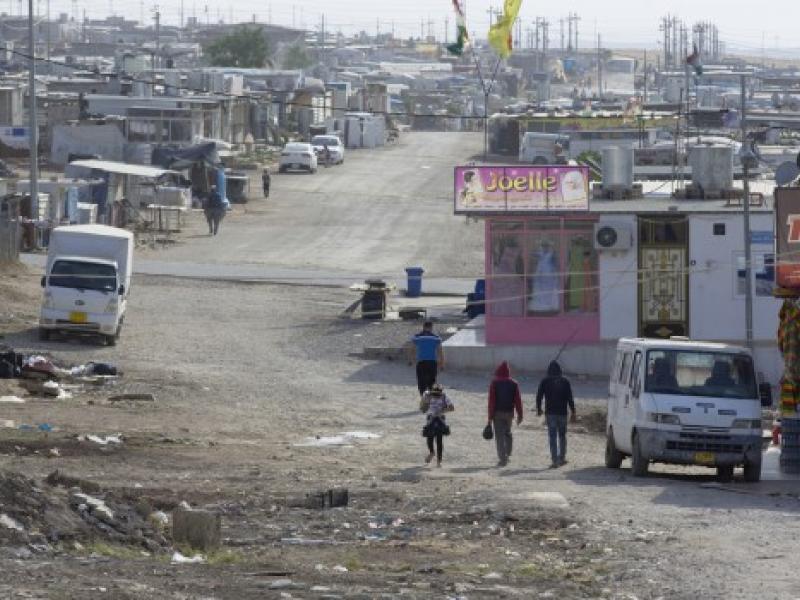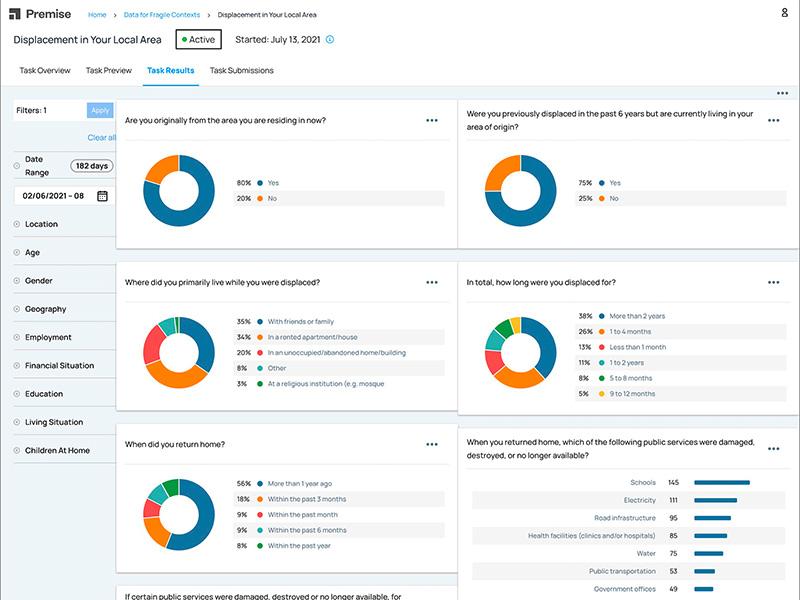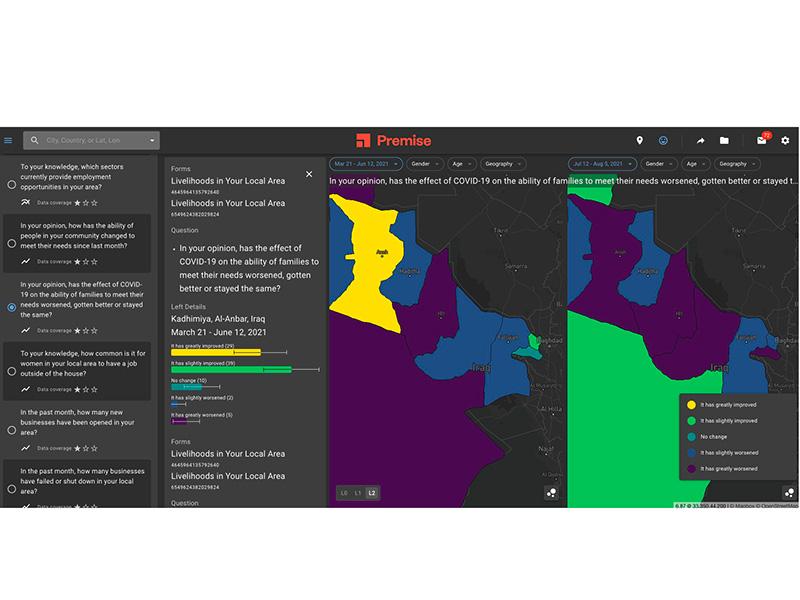Data in fragile contexts: new approaches for context monitoring
Supporting the implementation of mandated tasks through digital technologies | Christian Merz, Heike Wintershoff, Benjamin ScheffzikDevelopment and data
A look at the partner countries of GIZ (Deutsche Gesellschaft für Internationale Zusammenarbeit) reveals that 75% are classified as fragile and conflict-affected and the number of projects in these contexts is increasing. Fragile countries are often affected by violent conflict and face significant challenges in delivering basic services, economic opportunities and security for its people. In these contexts, transitional development assistance, a central instrument of German development cooperation, tries to support the reestablishment of conditions for a peaceful economic and social reconstruction process.
Accordingly, the GIZ project ‘Restoration of peace, livelihoods and economic cycles in Anbar, Iraq’ (RePLECA) focuses on the rehabilitation of productive and social basic infrastructure in order to reactivate local economic cycles and the creation of income opportunities. These, in turn, contribute to the re-integration of internally displaced people (IDPs) and promote peaceful and inclusive co-existence in Anbar.
The project relies on detailed information for planning, steering, monitoring and evaluation. Up-to-date information is key in these dynamic environments and reliable ground data is crucial for the quality of GIZ-provided services as well as for ensuring conflict-sensitive implementation.
Challenge
In fragile contexts data is often not available, up-to-date or reliable. Most data sources are outdated (e.g. household censuses) or highly aggregated (e.g. population structure provided only on a macro/national scale). In addition, security and resource constraints in fragile contexts make third-party monitoring with granular data a time-consuming, expensive and sometimes impossible task.
In the framework of the transitional development assistance project in Iraq, GIZ worked together with a third-party service provider that delivers monthly context monitoring reports. These reports combine information from Focus Group Discussions, Key Informant Interviews, web and to some extent social media sources, local NGOs, local administrative representatives and international agencies. The reports provide brief updates of the current context in seven locations across the governorates, with a focus on six themes: population flow, community tensions, public services and aid focus, governance, security and livelihoods.
The heterogeneity of beneficiaries (refugees, IDPs, returnees, members of host communities) is a major challenge for a comprehensive understanding of the status quo and future trends along the six themes, as well as for identifying potential conflicts and designing the most effective interventions to restore peace, livelihoods and economic opportunities.
In order to tailor interventions, it is key to track beneficiaries on a sub-district level, to identify societal and economic trends and to correlate potential conflicts with dynamic characteristics of individual beneficiary groups. For example, current conflicts can be related to territorial claims, land ownership, (past) affiliation with the so-called Islamic State, domestic violence, limited available resources, etc. depending on the location and beneficiary group.
GIZ Data Lab experiment “Data in Fragile Contexts”
The GIZ Data Lab was founded in 2019 and conducts experiments in the field of Data for Development (D4D), tests concrete hypotheses about creative, data-driven solutions and shares relevant insights with the international development community. Our experiments aim to develop and test cooperative, data-based methods while striking an appropriate balance between what is possible and what is ethical. With a strong focus on learning and a philosophy of “Working Out Loud” we seek to share our experiences and discoveries as valuable contributions to the overall evolution of the industry, cooperating with partners who share our values of collaboration and transparency.
The “Data in Fragile Contexts” (DFC) experiment explores if and how multiple data sources can be systematically merged/ cross-referenced in order to provide reliable, potentially real-time metrics to assess for instance basic public service delivery. With the right methodology and standards, additional layers can fill data gaps and further refine the information necessary to prove (or disprove) assumptions that build the basis for project-steering decisions. In the case of the collaborative GIZ transitional development assistance project in Anbar, an emphasis of the monitoring is put on the interdependency between the project activities and the context. Consequently, the key question that this experiment intends to address is “how can we utilize alternative data sources in order to better understand contextual realities on the ground that are correlated with conflict dynamics”?
Approach
In the project, we expand on traditional methodologies by leveraging alternative data sources and systematically merge and cross-reference them to provide reliable – even real-time – information to assess the status of beneficiary behavior and perceptions and their correlation with potential conflicts.
Secondary data of interest include websites, open data, citizen generated data, contributor networks etc. Our aim is to prove our hypothesis that the integration of alternative data supports the validation of findings (e.g. through Key Informant Interviews) and provides further details on beneficiaries’ behavior beyond the current context monitoring reports. Except for a higher frequency and quantity of data gathering, we aim to increase the quality of information. For this experiment, GIZ piloted a cooperation with Premise Data, a data and analytics platform powered by a global network of on-the-ground contributors, data science, and machine learning.
In partnership with Premise, we have explored a crowd sourcing exercise to gather information from representatives of the local population in Anbar and Ninewa, Iraq. Two iterative cycles of data gathering have been conducted along the following categories:
• Community dynamics
• Displacement
• Dispute resolution
• Humanitarian assistance
• Livelihoods
• Markets
Tasks for data gathering and submission have been advertised via social media and range from mini surveys to more complex tasks such as locating and characterizing public markets, including submitting photographs for reference.
First results and next steps
Overall, we have received 3,700 submissions from within existing members of Premise’s contributor network and newly recruited contributors, with most of the contributors being between 18 and 25 years old. Unfortunately, they only comprise 23 % women. To ensure the validity of the findings of the project, it will be essential going forward to achieve a representative distribution of the local population amongst the contributors.
According to our early experience, crowd sourcing approaches have the potential to add significant value to the existing toolbox, delivering bigger data of good quality at lower costs compared to more traditional data gathering exercises.
Nevertheless, we are confident that the methodology presents valuable results for project monitoring and steering. The first evaluation of the contributor network data is promising, although building the basis for a diverse and representative contributor network – especially in rural areas – remains a challenge. Initial cross-referencing of the contributors’ responses with context monitoring data gathered through Key Informant Interviews and Focus Group Discussions show similarities and confirm identified trends. Simultaneously, the analysis showed that a coherent design of the different data collection methodologies (e.g., comparable formulation of a) survey questionnaires and b) guiding questions for interviews) is key to producing “comparable” responses/information.
According to our early experience, crowd sourcing approaches have the potential to add significant value to the existing toolbox, delivering bigger data of good quality at lower costs compared to more traditional data gathering exercises. The GIZ Data Lab experiment “Data in Fragile Contexts” will continue to explore the use of additional data sources (such as social media) in order to enhance our projects’ capabilities of producing up-to-date situational assessments and thus, strengthen evidence-based decision making.
DOWNLOAD ARTICLE
IMAGES
- Authors | Christian Merz, Heike Wintershoff, Benjamin Scheffzik priv.
- Iraq | © GIZ
- Figure 1 and Figure 2 | © Premise/GIZ



